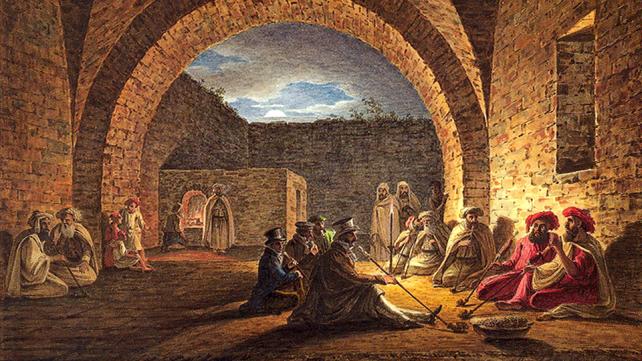
"The meeting was so disorganized! Why can't we get our act together?"
"Who made him the leader? I thought we were supposed to elect the president?"
"Why didn't the fundraising dinner start on time? I wasted two hours just sitting and watching organizers set up tables and chairs."
These types of comments can be heard in many Muslim communities across America. While the criticisms are valid, they are usually ignored in the interest of not offending anyone.
The argument goes something like this: why point out the weaknesses of other Muslims and our institutions, especially publicly? Criticism is bound to deflate enthusiasm. Why criticize an institution that is working relatively well, despite some mismanagement, patronage or disorganization? Why be critical when it will only turn Muslims away from each other instead of unifying them?
This policy of withholding constructive criticism has not helped us. For instance, the problem of punctuality persists at our events, be they social, political or otherwise. Some Muslims have coined the term "Muslim Standard Time" to describe this phenomena. Others use another self-hate term: "Desi Time". If some honest criticism was given and accepted, we could all work on this problem individually and collectively to ensure that Muslims and their events are punctual.
The Prophet Mohamed, peace and blessings be upon him, has said: "The believers are like mirrors for each other…" (Abu Dawud).
Why do we look into the mirror? To check out our appearance and how it can be improved. Similarly, we must give each other constructive criticism so that as a community we are constantly improving.
Granted, some criticism defeats itself when it is characterized by harshness, rudeness and a lack of balance. This is perhaps what has led many of us to overemphasize praising good works while turning a blind eye to serious problems in our leaders and institutions. However, while there is an Adab (Islamic etiquette) of criticism, the absence of this etiquette should not be a reason to criticize someone raising an objection or pointing out some mistakes. It is the duty of the Muslim leadership to encourage both criticism as well as its Adab without using the lack of etiquette to discourage critical feedback itself. It's better to have poorly presented criticism than no feedback at all.
Criticism doesn't harm unity. Instead, it makes it stronger because Muslims then work together to solve problems for the benefit of the community.
It's worse when the Muslim leadership remains critically silent
Absence of constructive criticism especially hurts us when our leadership is silent. Take for example the issues of suicide bombings and the killing of civilians. Prophet Mohamed, peace and blessings be upon him, prohibited suicide in all circumstances. He also categorically prohibited killing noncombatants. He was on assignment from Allah. If his noble cause did not justify killing noncombatants, then no cause on earth can justify killing civilians, no matter how much injustice and oppression one is subjected to.
Most Muslims agree to these principles given to us by the Prophet. But how many Muslim leaders have you heard condemning suicide bombings and killing noncombatants in their writings and sermons? I have personally always condemned these actions if someone asked me, but I never thought there was a need to give a Friday sermon about the issue until 9/11. Maybe most Muslim leaders also consider it wrong and assume that since all Muslims agree, there is no need to assert that opinion. But the need is now more important than ever before.
Of all the people, it had to be Dr. Yusuf Qaradawi. I did not expect him to approve of suicide bombings. He is the author of a book against extremism which I recommend to many. He approves of the suicide bombing of Palestinians against Israel, but has condemned it in reference to September 11. What is the difference between the two cases except that the magnitude and impact of 9/11 was extraordinary because of its casualties and the fact that we watched this terrorism live on television? Is Dr. Qaradawi's opinion sound? What principles of Fiqh (Islamic jurisprudence) allow him to issue this Fatwa? What is the actual text of this Fatwa? This is worth a major critical debate since never in Islamic history has the killing of civilians been allowed. Muslims may not have followed the law in some cases, but the Islamic law of war has never, repeat never, been changed to allow killing noncombatants. Will this discussion disunite Muslims? Will it help the enemy? Can our scholars discuss Dr. Qaradawi's Fatwa?
The Taliban are being humiliated by almost everyone. It doesn't feel "honorable" to criticize them while bombs are still falling on them. But the question is why did we not take a stand against their injustice? Only one Muslim editor, Dr. Aslam Abdullah of The Minaret magazine, wrote against the Taliban forcing people to grow a beard and wear Hijab when they came into power over five years ago. Professor Ingrid Mattson, who had actually worked with Afghan refugees for years, also spoke openly against the Taliban's interpretations of Islam. In addition, this author criticized them in some Friday sermons but like others, never took their interpretation of Islam very seriously. There is not a single example of the merciful Prophet punishing people for not having a beard or wearing Hijab. Are the Taliban better Muslims than the Prophet?
Maybe we were all so charitable towards the Taliban because they successfully established peace in war-torn Afghanistan, and now we feel it's not nice to kick someone who is already down. But it's not the Taliban that should have been the focus of the criticism, it's their understanding of Islam. Even in Chicago there are a few Masjids where women cannot enter. I wish I hadn't stopped a demonstration in front of one of these Masjids a few years ago, by requesting a dialogue between the mosque's administration and the protesters.
Why did some national Muslim organizations jump to support the bombing of Afghanistan and then condemn it within weeks? What changed during these few weeks which was not known earlier? What decision-making process was used the first time and what method was used the second time? Were they right the first time or the second time?
Right here on the Sound Vision website's forums, there are people who will take the side of anyone who ups the ante against the United States. The Quran commands: "O ye who believe! Stand out firmly for Allah, as witnesses to fair dealing, and let not the hatred of others to you make you swerve to wrong and depart from justice. Be just: that is next to Piety: and fear Allah. For Allah is well-acquainted with all that ye do." [Quran 5:8].
Maybe it's easier to criticize "others." It's easy to side with Bosnia against the Serbs, the Palestinians against Israel, Kashmiris against India and Chechens against Russia. But the Islamic concept of justice does not allow us to remain silent when we wrong others. Muslims are not a nation in the sense of nationalism. We are asked to be just and truthful even if that hurts us individually or collectively. "O ye who believe! Stand out firmly for justice, as witnesses to Allah, even as against yourselves, or your parents, or your kin, and whether it be (against) rich or poor: for Allah can best protect both. Follow not the lusts (of your hearts), lest ye swerve, and if ye distort (justice) or decline to do justice, verily Allah is well-acquainted with all that ye do." [Quran 4:35].
Public Criticism verses Private Criticism
Some Muslims take a position that public criticism is harmful for Muslim unity. I wonder what unity is out there which will be destroyed by public criticism?
Muslims number over a billion people. We cannot sit in one living room together to thrash out our issues in private. Matters regarding public leaders were always discussed publicly in the golden era of Islam. All Islamic scholars agree that the sin of Gheebah (backbiting) does not cover public officials, Muslim leaders or public affairs. It is the tyrants and the dictators among us who bring up the charge of disunity to stop the truth from challenging them.
There is of course a distinction between criticism on an individual level and on a collective level. On an individual level, according to Islamic teachings, it is preferred to give advice to a person in private, without humiliating him or her. This allows a person to avoid embarrassment while gaining from the criticism. In the long run, this helps him or her become a better person, thus strengthening the community.
However, when it comes to public figures and institutions, the need for privacy is optional but not necessary. This is indicated in numerous examples from Islamic history. For example, Umar ibn al-Khattab, the second Khalifa of Islam, was subject to constructive criticism on a number of occasions, including during one of his Friday sermons. He did not react with anger at this public questioning of his actions. Rather, he explained himself. And when someone tried to stop the critical person, he interfered saying that if that Muslim did not criticize Umar he is not good for the Muslims and if Umar didn't listen to his criticism he was not good for the Ummah. If someone like Umar (may Allah be pleased with him) could be publicly criticized, who are our present-day leaders and institutions to become upset when we do the same in questioning their actions?
The Need for a Critical Discourse
Why were Afghans able to defeat the former Soviet Union, but unable to resolve their infighting? Who is going to study this critical issue if not Muslims? Millions of people were killed and injured in Afghanistan. It still has more landmines than anywhere in the world. Now, our country has probably killed four times more Afghans than Americans killed in the September 11 terrorist attacks.
There seems to be no immediate end to the tragic Afghan situation which is now being referred to as the "new great game." But the question is how many Muslims have written analytical books on the whole Afghan saga spanning almost twenty-five years now? I have read about 40 books on this topic. None of the authors were Muslim. Don't we owe it to ourselves to study this ongoing tragedy? The study of critical issues may provide insight which will help Muslims think, discuss, strategize and use their resources better, which will make us stronger not weaker.
Terrorism is a Muslim issue. Muslims are the number one victims of violence, terrorism and oppression in the world. As a result we constitute the largest number of refugees on the planet. This is not all inflicted by non-Muslims although a good part does come from Israel in relation to Palestine and from India in connection to Kashmir. A substantial part of it is internal. But where are our experts on terrorism? In the absence of that critical insight, Muslims in America are being treated more like suspects instead of assets in the fight against terrorism.
Criticizing the Extremists Among "Us"
We have ignored the extremists among us. But we can no longer do this, as ignoring sometimes amounts to condoning. For example, convention after convention, I have seen some extremists disrupt an entire session. Ramsey Clark has probably done more for Iraq than any Muslim organization in America. But as he spoke a couple of years ago at ISNA, some of the young and restless started an agitation against allowing a "Kafir" to speak at the convention. These same type of people have disrupted Friday sermons and Eid prayers when they disagree with a speaker. Who are these people? They have a right to disagree but do they have a right to disrupt? Why does no one name them? What secret group are they part of? What is their ideology? If their hate is so strong why do they continue to live among "Kafirs" and get paid by "Kafirs?" When did we enter this social contract that criticizing these people will destroy Muslim unity?
Are these the same people who teach youth that this country is Darul Harb (abode of war) and for this reason they don't have to follow American laws? About twelve years ago, I wrote to three top Islamic scholars in America to come up with a consensual about the archaic term of Darul-Harb because of its implications for our time. This terminology had a very different meaning twelve centuries ago when the concept of citizenry with individual freedom, rights and responsibilities vis-à-vis the state did not exist. I am still waiting for an answer. One of the scholars I wrote to admitted that he is afraid of "these people", which is why he has not delved into the debate. Who are 'these people'?
There is indeed an underlying street ideology of lawlessness which thrives among some of the young and the angry which bases itself on this unaddressed theological point of Darul-Harb. This term is neither explicitly found in the Quran nor in the Sunnah of the Prophet. It was not an accident that phrases like, 'it's all right to rob banks in America to finance Jihad against Egyptian tyrants', popped up in the speeches and conversations of Shaikh Omar Abdur Rehman. These type of phrases constitute the whole of the conspiracy case against the blind Shaikh. In the absence of any proof of terrorism, an archaic civil war law was used to punish him for his words.
But the Darul Harb and Darul Islam debate is just one issue. The other is the use of the word "Kafir" that has become so prevalent in some communities. Kids are calling each other Kafir. The Prophet has clearly forbidden this Kafir calling, but how many Friday sermons and articles in the Muslim media have you seen against this illegitimate practice? Muslim organizations in America are being questioned about participating in a "Kafir" system.
This Kafir calling does not stop just at that. Shias have been in Afghanistan for centuries without any problems. But under the Taliban these "Kafirs" have been massacred. In the last ten years Karachi, Pakistan has also seen the murder of 1,865 Shias and 810 Sunnis at each other's hands. When will the fanatic Shias and Sunnis learn that if the Irish and British could not win after hundreds of years of killing each other, they should leave their differences unresolved for Allah to tell them right from wrong?
Muslim media must play a role
Muslim newspapers and magazines give us information about faith, international issues and some community news. But what we don't see is a constructive and critical discussion of Muslim organizations, leadership, their plans and agenda.
Why do 75% of new Muslims in America leave Islam within a few years of embracing the faith? Why is the leadership of most Muslim organizations in America made up of volunteers? Why are our Islamic weekend schools failing? Why does Sufi Shaikh Hisham Kabbani say what he says? Who represents Muslims? Who appoints our leaders? Who thinks for us? How did Muslim leaders decide to deliver Muslim support in year 2000 to then-Governor George W. Bush? How is the level of ethnic and gender representation in our institutions? These and other similar issues need to be subject to scrutiny on a regular basis so that we can learn, grow and better serve our communities.
We have about 20 Muslim relief organizations raising probably about $50 million. Now three of the top ones have been banned by the government without any judicial process. Muslim media could have played a role which the mainstream media has played with other charities by publishing a comparative analysis of Muslim relief organizations in America. The media could have helped answer questions like what are the systems and processes of these organizations? What is the ratio of administrative costs and fundraising costs? How is their leadership elected? What is their history? How are funds distributed? What kind of systems of checks and balances do they have? We kept trusting the relief organizations but obviously our government didn't. So what are we going to do now, abandon Zakat, a pillar of Islam?
Open processes, a known system of checks and balances and broader community scrutiny might have protected these charities if the Muslim media had kept an eye on these institutions instead of just printing their advertisements . We all relied on Uncle Sam's tax-exempt certificate to ensure the legitimacy of these charities, figuring that is all a citizen can do. But now, in the US government's drive to punish without proof, and the media's frenzy to hang without trial, the IRS paper was not sufficient to protect the charities. Nor is there legal recourse available for Muslims to recover the Zakat money which was given for the poor and the hungry.
Since one or the other Muslim organization owns these magazines, it seems that there is an unofficial détente of silence among them. Critical issues are not brought up. For instance, ISNA began its downfall in the eighties when its Sudanese and Egyptian leadership clashed, but neither the rank and file of ISNA nor the Muslim community in America discussed what has happened. Another example of something the media could have paid attention to is why couldn't Imam Jamil al-Amin, the chairman of the Islamic Shura Council of North America, raise even $10,000 for his legal defense? The "hush culture" which allows such important issues to be ignored may be a result of so many in the Muslim leadership escaping Israeli and Arab regimes, where a demand for freedom and action for liberty means torture, prison and a blown up home.
In the last three years, through our articles, Sound Vision has been critical of a number of problems found in some Muslim communities. The aim of these criticisms has been to to shed light on our challenges for further improvement. Whether it's issues pertaining to the family like domestic violence and the difficulty many couples face in the first years of marriage, or problems that touch all members of the Muslim community such as inadequate Zakat distribution and racism, we have tried to point out problems in a balanced and fair manner in order to include them in our community's discourse so that we can work for change. .
If we do see writers engaging in constructive criticism in the Muslim media, we should send them a note of encouragement. Similarly, there is nothing wrong with having more cartoons in the Muslim media which point out the problems of Muslim policies and behavior. An integral part of the civil rights movement of the 1960s and 70s were comedians who not only laughed at the laughable of racism, but also brought a mirror for the audience. Cartoons don't always have to be focused on "others." For instance, why not have a cartoon showing a national Muslim leader supporting the bombing of Afghanistan in the national media, while condemning it in the ethnic Muslim media?
The presence of a vibrant Muslim media will provide a forum to develop a Muslim agenda, its leadership and a check and balance system, since it will be a while before most Muslims will allow the mainstream media to poke its nose into "our" affairs.
Conclusion
It is a difficult time for us. Muslims are under tremendous pressure in the world as well as in the US. It seems like a field day has been declared on us. Anyone can do anything to Muslims and no one will even raise a finger to help. It is a sensitive time for Muslims to hear criticism from one of their own. But I am afraid that when tensions are a little less than what they are now, we will all be relaxed and will not pay attention to this important weakness of community life. Muslims are being discussed by everyone, why don't we discuss ourselves as well? We know ourselves better, don't we?
The early Muslim community's dynamism and unity were not harmed by constructive criticism, partly because we had leaders who were open to questioning of their actions and willing to accept criticism. As well, Muslims were not afraid to point out weaknesses in a frank, open and respectful manner in the interest of Islam and the Muslim community. Our leaders and the managers of our institutions today must remember that criticism is part of the leadership territory.
Let us drop the illusion that we are doing a favor to Muslim unity by withholding our constructive criticism. It is time for Muslims to heed Allah's call in the Quran to stand up for justice and speak the truth, even if it is against ourselves (Quran 4:135). Let us drop the attitude of "if s/he's Muslim, s/he's got to be right" which is not helpful at all. This lack of criticism does not befit a community that is required to enjoin the good and stand up for justice. Nor does it strengthen the cause of Muslim unity, which is based on properly adhering to Islamic teachings, not overlooking or shunning them.

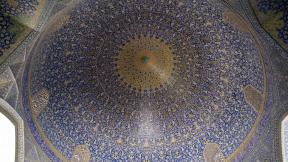
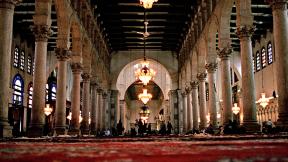

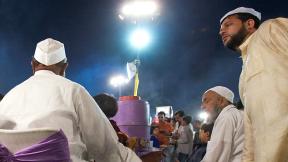
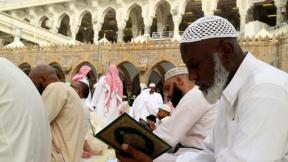


Add new comment